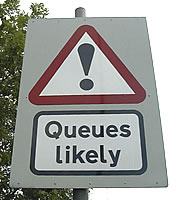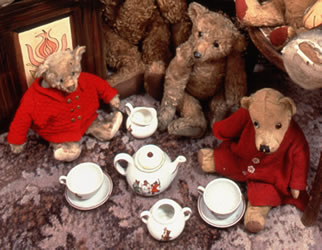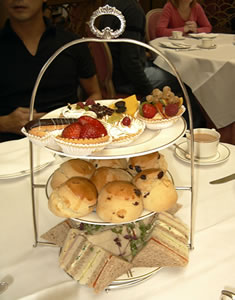

|
|
Study, work or travel in the UK. British
culture and life.
|
|
||
|
|
|
|
||
 |
||||
|
|
|
|
||
 |
||||
|
Personal
/ Manners
|
||||
|
Polite social behaviour in the UK
|
||||
|
Sections:
|
Introduction |
 |
| Small talk | ||
| Tipping | ||
| Food etiquette | ||
| Business etiquette | ||
| Links |
 Queuing fairly is important in the UK: if someone was there before you, let him/her be served first |
 |
The
Done Thing Author: Simon Fanshawe Publisher: Century Date: June 2005 |
 |
"The
Times" Book of Modern Manners Authors: John Morgan Publisher: Times Books Date: June 2000 |
 |
A
Modern Girl's Guide to Etiquette Author: Sarah Ivens Publisher: Piatkus Books Date: August 2003 |
 |
Debrett's
New Guide to Etiquette and Modern Manners Authors: John Morgan Publisher: Headline Date: August 1999 |
 |
Britain:
a quick guide to customs and etiquette Author: Paul Norbury Publisher: Kuperard Date: October 2003 |
 |
The
Britiquette Series [e-books, downloadable PDF files]: - The Must-Have Guide to Posh Nosh Table Manners - The Slightly Rude But Much Needed Guide to Social Grace & Good Manners Author: S. Elaine Grace |
|
Click here for other books about: etiquette
|
|||
- Introductions, eg "Hello. May I introduce myself? My name is Mark"
- Travel, eg "Did you manage to find here OK?" or "Did you have
a good journey?"
- Family, eg "How is your family?" (but only if you already know about
the person's family)
- Hospitality, eg "Can I get you something to eat or drink?"
- The weather, eg "It's a lovely day today, isn't it?"
- Holidays, eg "Are you going anywhere this weekend?" or "Are
you going anywhere on holiday this year?"
- Nature, eg "The garden looks lovely, doesn't it?"
- Pets, eg "What a lovely dog. What is his name?" (British people
love dogs or cats)
- General news, eg "What do you think about the recent floods?" (but
safer to avoid gossip and politics)
- Films, eg "Have you seen the film Bridget Jones's Diary?"
- Television, eg "Did you see The X Factor last night?"
- Music, eg "What sort of music do you like?"
- Books, eg "Have you read any good books recently?" (but only if
you know the person likes reading)
- Sport, eg "Have you been watching Wimbledon?" (note that many British
people, especially men, enjoy talking about football)
- Hobbies, eg "What do you enjoy doing in your spare time?"
- Business, eg "How's your business going?" (but only ask if you know
the person has a business)
- Studies, eg "What are you studying?" (but only ask if you know the
person is a student)
- Work, eg "What sort of work do you do?"
- Food, eg "I had a lovely Chinese meal last night - do you like Chinese
food?"
- General matters about the person you are talking to, eg "Have you lived
in this area long?"
- General matters on subjects that you know that interests the person you are
talking to, eg cars, film stars etc
Which topics are best avoided for small talk?
You may need to be careful when you talk about some topics, especially with people that you've only just met, people who are older than you, people who appear to have strong religious or political views, or people who may have some personal problems or sensitivities. For example, be cautious if you discuss these subjects:
- Age, eg "How old are you?"
- Appearance or weight, eg "You seem to have put on some weight"
- Personal gossip about somebody you know
- Jokes that might offend (especially sexist or racist jokes)
- Money, eg "How much do you earn?"
- Sex (some people have strong religious views about this, or are embarrassed
by the subject)
- Previous or current relationships, eg "Do you have a girlfriend?"
- Politics, eg "Who did you vote for at the last election?"
- Religion, eg "Do you believe in God?"
- Criticisms or complaints, eg "Why is British food so bad?"
Back to top
There are a number of situations in which it is common to leave a tip
(sometimes called a gratuity), although you should not feel that you
have to do this if you cannot afford to do so or if you were not happy with
the service provided.
- Restaurant or café
Usually people only pay a tip in a restaurant or café when there is a
waiter service (not for takeaway meals or self-service meals). Normally people
add about 10% to the bill and make the amount a whole number of pounds. Check
the menu and the bill to see if a service charge is already included in the
price. For example, it may say: "A discretionary 10% service charge has
been included" or "service is included", or you may just see
that 10% has been added at the bottom of the bill (you can refuse to pay this
part if you were unhappy with the service). If the service charge is not included
the bill may say "Service charge not included" or "Gratuities
are at the customer's discretion".
- Hairdresser's
It is common for people to leave a small tip (maybe one or two pounds) as a
tip.
- Taxi
It is common to add 10% to the taxi fare. For more details about paying for
taxis, see: Travel/Transport/Taxis.
- Hotel
You may want to give a small tip (perhaps 1 or 2 pounds) when a member of hotel
staff gives you a special service. For example, a tip may be appropriate if
a porter carries your baggage to your room when you arrive, if the concierge
helps you (for example by helping you to buy tickets, book a restaurant or plan
your shopping or sightseeing, or by keeping your bags safe before check-in or
after check-out) or if a doorman finds a taxi for you. It is more polite if
you do not show the money when you are giving it - put it in your hand, say
thank you, shake the person's hand and press the money into the person's hand.
Back to top
 Teddy Bear Museum, Stratford-upon-Avon |
 Afternoon tea at Harrods |
Understanding the menu
"Could you explain what ____ is please?"
"Could you tell me what the soup of the day is, please?"
"Could you tell me today's specials, please?"
Using cutlery and plates
In general, if there are several pieces of cutlery, use forks, knives or
spoons on the outside first
If there is a side plate for eating bread rolls, use the plate on your left-hand
side. Put some butter on the side of the plate. Tear bread from the roll, then
add butter just before eating it.
Eat soup quietly, without lifting the bowl off the table.
Eating peas
To be very polite, you should eat peas by squashing them against the reverse
side of your fork
Asking for more
If at someone's home, you shouldn't ask for more unless your host offers it
by asking, "Would you like some more?" or, "Would you like seconds?"
Possible answers include "Yes please", "Just a little bit, please",
or to say no, it is best to say something like "That was lovely, but I'm
full, thank you"
Dinner parties
If you cannot eat a certain type of food or have some special needs, tell your
host several days before the dinner party.
Arrive on time, but try to avoid being early in case your host is not ready.
Take a bottle of wine or some flowers or chocolates to give to the host as soon
as you have arrived.
Going to the toilet
"Excuse me. Could you tell me where the toilet is, please?" (in someone's
house)
"Excuse me. Could you tell me where the ladies / gents is, please?"
(in a cafe or restaurant)
Asking for the bill
"May I have the bill, please?"
If the bill says "service not included", it is usual to add about
10% to the bill.
In some restaurants, a 10% service charge is automatically added to the bill
Back to top
Traditional British events and customs: Ideas/Events
Improving your English speaking: English/Speaking
Pub etiquette: Britain/Food/Pubs
The countries of the UK: Britain/Countries
Home page: Home
Back to top
© UK Student Life 2002-2009
|
|
|